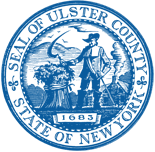A: In keeping with the rules observed in most Veteran cemeteries, only natural flowers are allowed to be left (not planted) at a grave, and will be removed prior to wilting (approx. one week).
FAQ: Veteran Services Agency
Q: What are the rules concerning flowers and other grave decorations?
Q: How is an “eligible veteran” defined?
A: The veteran must have served in armed forces of the U.S. or National Guard, received no less than a “general” discharge and been a resident of Ulster County. Veterans with less than two (2) years active service must have their bronze marker paid for by the family/informant.
Q: Who can be buried there?
A: Eligible veterans and optionally, a spouse.
Q: Does the County own the UCVC?
A: No. The County contracts with the NPRC to partition a section exclusively designated as the UCVC. Once a veteran is interred there, a plot deed is issued by NPRC in the name of the County for the deceased.
Q: Where is the Ulster County Veterans Cemetery located?
A: 81 Plains Road New Paltz, NY, on the grounds of the New Paltz Rural Cemetery (NPRC).
Q: Do veterans get a discount on property taxes?
A: Eligible veterans and un-remarried spouses may receive a partial exemption of their property tax. Applications are due to the local assessor by March 1st for the following tax year. Eligibility requires active federal military service in war time. Exemption amounts increase if the veteran served in a combat zone or is service-connected disabled. Service in the Reserves and National Guard is not considered qualifying duty unless he/she was activated for full time Federal active duty (mobilized). Exemption amounts and limits vary by town and are determined by the local assessor. NYS Tax Form RP-458-a is required. Visit a Service Officer for more information.
Q: If my discharge is not “honorable”, can I request that it be changed?
A: Discharge upgrades are possible but rare. The Department of Defense will not consider upgrade requests beyond 15 years after discharge. The veteran must have evidence that the discharge was either “improper” or “inequitable.” Visit a Service Officer for more information.
Q: Are there survivor benefits for spouses of veterans?
A: Yes, if the veteran died from a service-connected disability, or was receiving pension benefits, then survivor benefits may be available. Eligibility rules are complex. It is best to visit a Service Officer for more information.
Q: Is there VA income assistance for elderly veterans?
A: The VA has “pension” benefits for eligible veterans who are unable to work, have very low income or are service-connected disabled. Eligibility rules are complex. It is best to visit a Service Officer for more information.
Q: Are there veteran education benefits?
A: Education benefits vary depending on when you served in the military and they expire 10 or 15 years after discharge. The Montgomery GI Bill is for veterans who served before 9/11/2001. The Post-9/11 GI Bill is for veterans who served after 9/11/2001. Eligibility and benefits vary. Visit the Veteran Services Agency office to discuss with a Service Officer or look at the VA website: http://www.gibill.va.gov/

